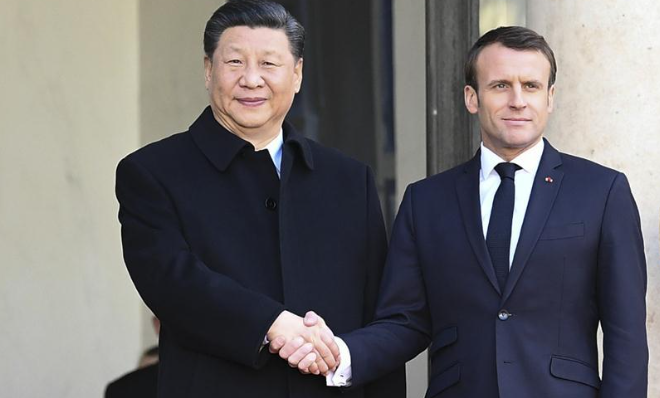PARIS — Chinese President Xi Jinping has embarked on a significant three-country tour of Europe, marking his first state visit to the continent in five years. Against the backdrop of strained China-EU relations due to trade disputes and Russia’s war on Ukraine, Xi’s visit carries substantial implications for both economic cooperation and geopolitical dynamics.
Key Destinations and Meetings
Xi’s European tour began in Paris, where he met with French President Emmanuel Macron. The two leaders engaged in discussions on a range of critical issues, including trade tensions, global crises, and the war in Ukraine. Macron emphasized the need for “fair rules” in trade, urging China to address concerns related to state subsidies and market distortions. Meanwhile, Xi aimed to lobby against the EU’s anti-subsidy investigations, particularly concerning electric vehicles, and stabilize diplomatic relationships.
The French capital also witnessed a trilateral meeting involving Xi, Macron, and the head of the European Commission, Ursula von der Leyen. Von der Leyen warned that the EU is prepared to use all trade protection instruments to shield itself from China’s aggressive trade practices. She highlighted the risk of China’s heavily subsidized manufacturing sector negatively impacting European industries and called for a level playing field.
Purpose and Intentions
Officially, Xi’s visit to Paris commemorates 60 years since diplomatic relations were established between France and China. France holds the distinction of being the first Western country to formally recognize the People’s Republic of China in 1964. However, beyond the ceremonies, Xi’s real objectives extend to addressing critical challenges:
- Trade Relations: Xi seeks to navigate the complexities of trade tensions. While China remains a significant source of inward investment for Serbia and Hungary, it faces scrutiny over its trade practices. The EU’s investigations into alleged market distortions and anti-subsidy measures have raised concerns. Xi’s discussions with Macron and von der Leyen aim to find common ground while safeguarding China’s interests.
- Geopolitical Dynamics: Amid Russia’s war on Ukraine, Xi’s European tour assumes geopolitical significance. China’s alignment with Russia has drawn attention, and Xi’s visit provides an opportunity to clarify China’s stance. His proposal for peace in Ukraine includes a 12-point plan, emphasizing a cease-fire, peace talks, and an end to sanctions against Russia. By engaging with European leaders, Xi aims to balance China’s interests while avoiding direct confrontation with the West.
Beyond France: Serbia and Hungary
Xi’s itinerary extends beyond France. In Belgrade, he meets with Serbia’s President Aleksandar Vučić, emphasizing China’s role as a significant investor in the country. Serbia, a pro-Russia nation, remains a crucial partner for China’s Belt and Road Initiative. The visit underscores economic ties and security cooperation.
Next, in Budapest, Xi will meet Hungary’s Prime Minister Viktor Orbán. Hungary, another pro-Russia country, has blocked EU motions critical of China on human rights. The discussion will likely touch upon China’s Belt and Road projects, including the Budapest-Belgrade high-speed rail link.
Xi’s visit: A balancing act
Xi’s European tour reflects China’s strategic balancing act. As he engages with European leaders, he must address trade imbalances, geopolitical tensions, and the war in Ukraine. The outcomes of these discussions will shape not only China-EU relations but also the broader global landscape. (zai)

